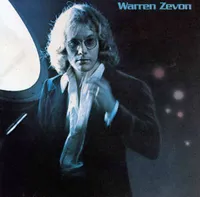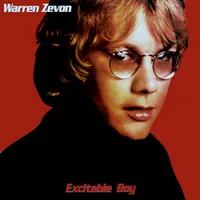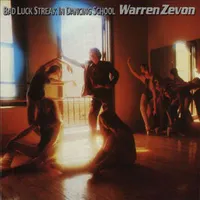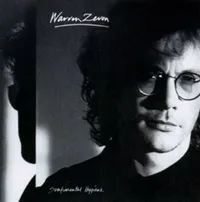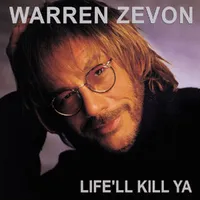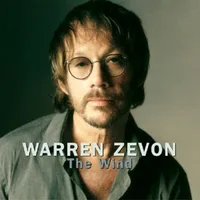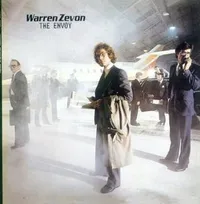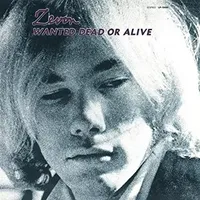The Warren Zevon albums you should definitely own
Warren Zevon could have carved out a career as a mainstream piano man were it not for his caustic wit, chemical-induced instability and general contempt for the world. These are his best albums

Select the newsletters you’d like to receive. Then, add your email to sign up.
You are now subscribed
Your newsletter sign-up was successful
Want to add more newsletters?

Every Friday
Louder
Louder’s weekly newsletter is jam-packed with the team’s personal highlights from the last seven days, including features, breaking news, reviews and tons of juicy exclusives from the world of alternative music.

Every Friday
Classic Rock
The Classic Rock newsletter is an essential read for the discerning rock fan. Every week we bring you the news, reviews and the very best features and interviews from our extensive archive. Written by rock fans for rock fans.

Every Friday
Metal Hammer
For the last four decades Metal Hammer has been the world’s greatest metal magazine. Created by metalheads for metalheads, ‘Hammer takes you behind the scenes, closer to the action, and nearer to the bands that you love the most.

Every Friday
Prog
The Prog newsletter brings you the very best of Prog Magazine and our website, every Friday. We'll deliver you the very latest news from the Prog universe, informative features and archive material from Prog’s impressive vault.
Warren Zevon died as he had lived: fearlessly. After being diagnosed with terminal cancer in 2002, he refused to wallow in depression or self-pity. Instead this most mercurial of musicians released a final, valedictory album, The Wind, and embarked on a series of interviews in which he treated his impending demise as a source of black comedy and philosophical rumination.
But then Zevon was never your typical singer-songwriter. Born in Chicago but coming of age in 60s Los Angeles, he could easily have carved out a successful career as a straight-down-the-line piano man like Elton John or Billy Joel, were it not for his caustic wit, chemical-induced instability and general contempt for the world. He gravitated towards life’s losers, underdogs and addicts, maybe because he saw something of himself in them. “I’m insane. I’m fucked up. I have problems,” he told one interviewer. “But I don’t get depressed and I don’t get bored.”
Zevon’s career was anything but predictable. His underwhelming 1969 debut album, Wanted Dead Or Alive, proved to be a false start, and it would be another seven years before he released a follow-up. The 1978 single Werewolves Of London propelled him to fame, but it remained his sole hit – something that proved a source of frustration and amusement to the man behind it. The 80s and 90s were equally erratic, commercially and personally, and although in the early 00s he underwent a mini-renaissance, it was soon cut terminally short.
By all accounts, Zevon wasn’t an easy man to be around. He was vain and combustible, egotistical and petty. But he was also charismatic, funny and more often than not the smartest guy in the room. His magnetic personality attracted an astonishing array of collaborators over the years: Bob Dylan, Bruce Springsteen, Tom Petty, David Gilmour and R.E.M. were just a few of the people who worked with him.
Zevon never made a ‘perfect’ album. But perfection was never the point; he was the rare artist who was defined as much by his flaws as by his successes, and it was those flaws that made him one of the most fascinating musicians America has ever produced.
Zevon died in 2003, aged 56. He was quipping to the end: “I might have made a tactical error in not going to a physician for 20 years. It was one of those phobias that really didn’t pay off,” he told longtime super fan David Letterman. He was never big enough and far too inconsistent to qualify for ‘American National Treasure’ status, although he’d probably bristle at the suggestion that he was a cult artist. The best description of Warren Zevon is that he was just Warren Zevon.

Zevon’s first proper album, at least in his reckoning, and the closest he came to a stone-cold classic. Roping in a bunch A-list muso buddies (Jackson Browne, Don Henley and Glenn Frey, Mick Fleetwood, Lindsey Buckingham, Stevie Nicks), he served up one of the great LA records.
His connections with the early-70s Laurel Canyon ‘mellow mafia’ are evident on Hasten Down The Wind and Desperados Under The Eaves, but the outlaw myth-making of Frank And Jesse James and the S&M-themed Poor Poor Pitiful Me had teeth and weren’t afraid to bare them. Best of all is the country ballad Carmelita, one of the finest junkies’ laments ever written.
Zevon’s third album was his breakthrough, thanks to Werewolves Of London. With its nagging piano hook, wolverine ‘Ow-oohs’ and surreal images of lycanthropes stalking Soho, it was an unlikely hit single on both sides of the Atlantic.
That song isn’t even the best thing on Excitable Boy. The anthemic Roland The Headless Thompson Gunner is a surreal critique of US foreign policy disguised as the tale of a ghostly mercenary hell-bent on revenge, while Lawyers, Guns And Money paints a gonzo picture of Zevon holed up in some South American hellhole. On the stark ballad Accidentally Like A Martyr, he even reigns in the snarkiness.
Bad Luck Streak In Dancing School (Asylum, 1980)
With hindsight, the success of Excitable Boy was a fluke. Certainly the follow-up didn’t have the same impact. It was nowhere near as consistent, while matters weren’t helped by the dated synthesisers Zevon insisted on slathering all over the album, undercutting the ironically macho Jungle Work and ruining Gorilla You’re A Desperado.
But Bad Luck Streak In Dancing School also features some of his finest songs. Play It All Night Long pours scorn on Lynyrd Skynyrd and their fans, and Jeannie Needs A Shooter (a title borrowed from an unreleased Springsteen song) is noir fiction set to a lush musical backdrop.
Sentimental Hygiene (Virgin, 1987)
Zevon spent the mid-80s recovering from drug and alcohol addiction. With R.E.M. as his backing band, this comeback album was tougher and more guitar-centric than anything he’d made before.
The taut Boom Boom Mancini, inspired by a real-life boxing match that ended in tragedy, is as pugilistic as its subject matter, while The Factory could have been a Tom Petty number were it not for the scabrous irony. He wasn’t above mocking his own past either – Detox Mansion casts a jaundiced eye over rehab culture, and the raucous Even A Dog Can Shake Hands sticks the knife into the music industry with venomous glee.
Life’ll Kill Ya (Artemis, 2000)
The 1990s knocked some humility into Zevon. When he returned at the start of the new millennium after another long break , the old brattiness had been supplanted by the wisdom of age.
That’s not to say the stripped-back Life’ll Kill Ya, a semi-concept album revolving around mortality, wasn’t funny or toothless. Two of its tracks stand among his best. A stark take on Steve Winwood’s Back In The High Life Again ditches the original’s 80s gloss, although its winking irony can’t hide the bleakness at its core. Even better is My Shit’s Fucked Up, a droll memento mori in which Zevon nailed the absurdity of death. Two years later, it didn’t seem so droll any more.
When Zevon was diagnosed with inoperable lung cancer, he could have given up the ghost there and then. Instead he got a bunch of famous friends (Springsteen, Petty, Billy Bob Thornton) to help him record a farewell album. And it stands among his best.
The shadow of death may hang over The Wind, but Dirty Life And Times and Disorder In The House are the sound of a man going out kicking. Still, it’s hard not to be moved by his cover of Knockin’ On Heaven’s Door and album closer Keep Me In Your Heart. Two weeks after its release, Zevon was dead, leaving this as the perfect valediction.
Zevon’s fifth album was his most direct yet, casting a jaundiced eye over the Middle East crisis on the title track and flooring the pedal on raucous rock’n’roll road anthem The Overdraft.
Those infernal keyboards stink the place up once again on Ain’t That Pretty At All, but the hushed Elvis Presley tribute Jesus Mentioned and hilariously self-pitying cuckold’s tale Hula Hula Boys are worth the price of entry alone.
If Zevon hoped this record would give him a much-needed hit, he was out of luck. The Envoy flopped, and he embarked on a drug and booze bender that put him out of action for the next five years.
Transverse City (Virgin, 1989)
Zevon was on a roll after his creative rebirth with Sentimental Hygiene, even if this follow-up, lacked that album’s knock-out punch.
Transverse City found the singer indulging his love of sci-fi, plugging into the futurism of Blade Runner and William Gibson’s cyberpunk novels and then-current Cold War concerns.
While the processed production instantly date-stamped it to the late 80s, a stellar line-up of guest guitarists – David Gilmour, Neil Young and Jerry Garcia – cut through the bullshit just at the right moments. And in Nobody’s In Love This Year, Zevon serves up his most personal and uncynical ballad.
Mutual apathy between Zevon and the general public meant he released only two studio albums during the 90s: Mr Bad Example (1991) and this, released four years later. Both are solid if unspectacular, possessing neither the class of his 70s work nor the focus of his 80s comeback.
Of the two, Mutineer edges it slightly. Recorded largely by Zevon alone in his home studio, it tamps down the more wayward edges of his past work. Opener Seminole Bingo and the title track are the standout numbers, bookending a set of songs that show their creator in more subdued mood than usual. The sound of an artist in a self-imposed holding pattern.
And one to avoid...
You can trust Louder
Wanted Dead Or Alive (Liberty, 1969)
Zevon expressed few regrets in his life, but his often overlooked debut album was one of them. Kim Fowley signed up as producer but, frustrated that the control-freak singer wanted to play all the instruments himself, quit mid-session. Its rocky gestation was only part of the problem.
A bigger issue was that Zevon couldn’t work out if he wanted to be a country singer, a psychedelic bluesman or a Randy Newman-style piano man, and fell short on all three fronts. Considerably less than the sum of its parts, it was released to what Zevon called “the sound of one hand clapping” – and deservedly so.
Sign up below to get the latest from Classic Rock, plus exclusive special offers, direct to your inbox!
Dave Everley has been writing about and occasionally humming along to music since the early 90s. During that time, he has been Deputy Editor on Kerrang! and Classic Rock, Associate Editor on Q magazine and staff writer/tea boy on Raw, not necessarily in that order. He has written for Metal Hammer, Louder, Prog, the Observer, Select, Mojo, the Evening Standard and the totally legendary Ultrakill. He is still waiting for Billy Gibbons to send him a bottle of hot sauce he was promised several years ago.
